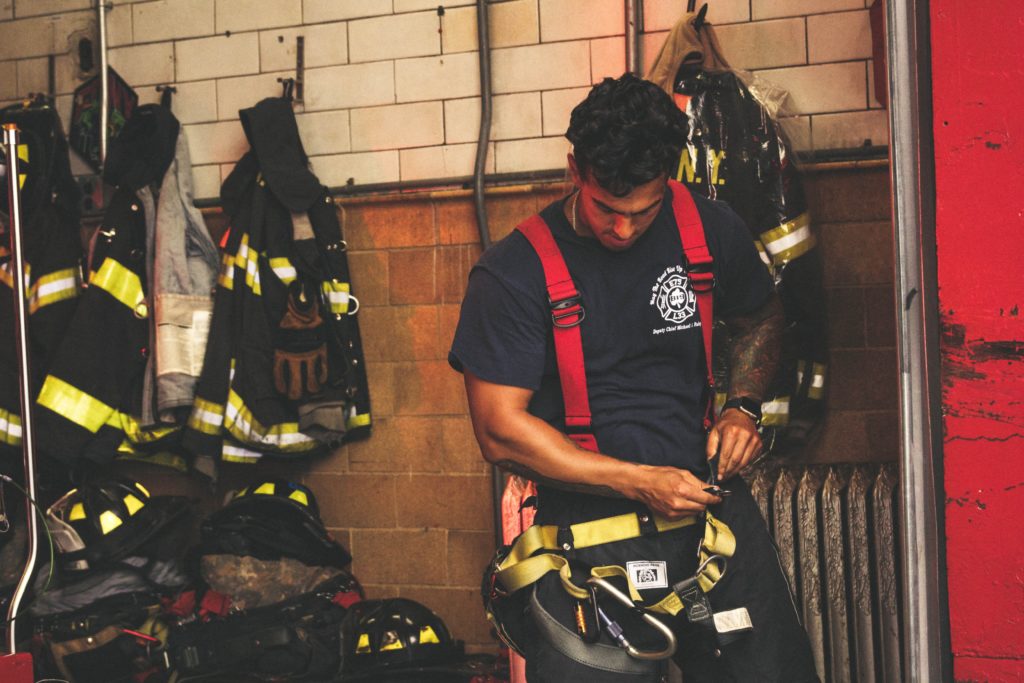When retired firefighter Peter Fulton planned a round of golf that Tuesday morning in June, he never expected to make local news for doing what came naturally to him — saving people. Yet, when a 59-year-old town inspector slipped down a sandy 20-foot trench, Fulton leapt into action, calling his former employee and lowering a hose to the victim as help rushed to the course.
For 35 years Fulton had worn the uniform, but the veteran rescuer knew — you never stop being a firefighter.
Dedication to their field and an accumulation of lifelong skills is what sets firefighters apart.
Every family that includes a firefighter quickly comes to understand the job doesn’t end at 5 p.m.
A company works as a team, running into society’s most violent and out-of-control situations, supporting each other as the rest of us watch from the sidelines, holding our breath while they climb a ladder to save a stranger.
As Eric J. Russell, Ed.D., CHPP, expressed in his commentary “On Police: A Firefighter’s Perspective,” “… because I was a firefighter, I was loved by the public, championed as a hero who risked his life to save the day. People simply trust firefighters, they confide in them, and there’s little animosity towards us even when things go wrong.”
Far beyond the community goodwill, though, is these warriors’ vital contribution to society’s safety net with training far exceeding fires and stranded kittens.
“Being a firefighter means you never know what to expect when you head out on a call,” explained Fire Chief Richard Ares, a 47-year veteran of the Gardner (Massachusetts) Fire Department, who retired in October, to The Gardner News. On the job — he counseled new recruits — firefighters stumble upon life’s funniest moments, as well as its most tragic. Rare is the auto accident without a fire truck nearby: Firefighters are our first-line defenders, negotiators, comfort-givers, rescuers.
Preparation starts at the Firefighting Academy. This November, in Springfield, Mass., 18 graduates completed the 50-day Career Recruit Firefighting Training Program.
Beyond learning how to respond to, contain, and control fires, these recruits receive training in public fire education, hazardous material incident mitigation, flammable liquids, stress management, confined space rescue techniques, and rappelling. The intensive, 10-week program for municipal firefighters involves classroom instruction, physical fitness training, firefighter skills training, and live firefighting practice, as reported in the CapeCod.com newsletter.
Throughout their careers, firefighters respond to emergencies most of us can’t imagine: chemical explosions, suicides, dog attacks… the list is as endless as man’s capacity for creating chaos.
Yet, their careers are dedicated to this very concept: their lives for ours. At the Hundred Club of Mass., we exist to ensure this greatest sacrifice is never forgotten. These men and women never stop being firefighters because they’ve transcended the average profession — they’re trained to save people and, occasionally, at the expense of their own lives, proffer the ultimate sacrifice. It’s a hard skill to set aside when retirement calls.
The Hundred Club of Mass. recognizes the bravery of the firefighter, police, and transit police divisions and is committed to compassionately caring for their surviving families for the rest of their lives. When a firefighter dies in the line of duty, The Hundred Club of Mass., Inc. is there to help, to hold, to support those who sustained their passion to serve. The Hundred Club of Mass., Inc. is a 501(c)(3) charitable organization incorporated in Massachusetts in 1959.


